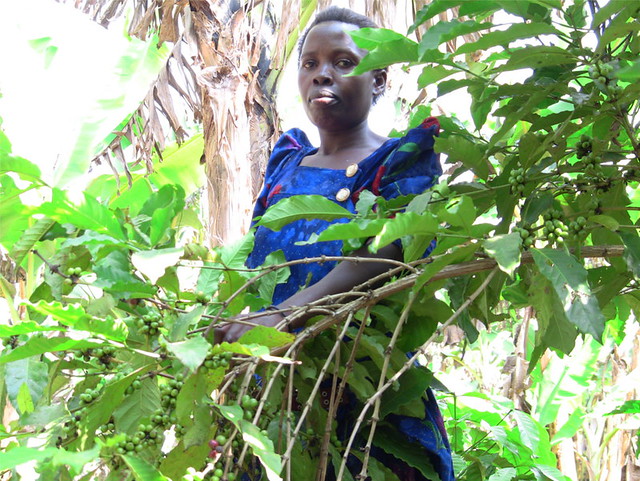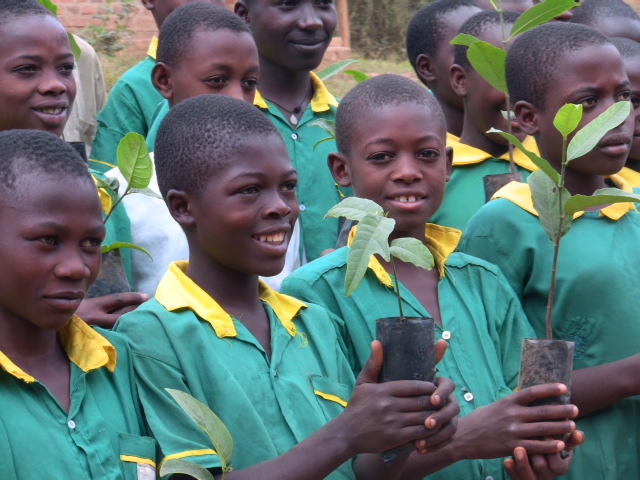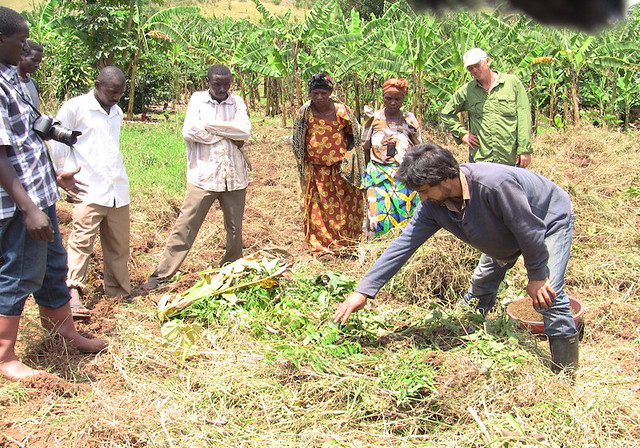by Michael Ahabwe Mugerwa, Executive Director, ICOD Action Network
 In spring of 2010, together with our Chicago based partner organisation, Project Focus we created and implemented a solar powered Internet Center that provided free permaculture and Information and Computer Technology (ICT) training to local farmers.
In spring of 2010, together with our Chicago based partner organisation, Project Focus we created and implemented a solar powered Internet Center that provided free permaculture and Information and Computer Technology (ICT) training to local farmers.
This center has since 2010 served as a resource for information sharing in areas of need such as agriculture, education and health to local communities.
Our permaculture and information-sharing program provides free training in permaculture and Information Technology to farmers and to elected “information agents” from each farming group.
The agents use their training to retrieve relevant information (focused on, but not limited, to agriculture - such as market access and prices, disease and pest control methods, weather patterns, etc) from the Internet center and post it in their respective villages for their communities to access at large. Hundreds of farmers now have access to information that they use to improve their farming enterprises and livelihoods.
When we turned five back in February of 2013, we decided to do something for our community; plant 5000 food trees (1000 trees for each year we had been in existence since 2008)! We wanted to contribute to our community's food security and environmental conservation efforts. We reached to multiple donors to support this project and we got $0.00. Instead of giving up after failing to get donor funding, we found another way; grow thousands of food trees ourselves and train thousands of school children and youth on how to plant them in their schools and communities.

Along the way, we realised how beneficial it is to use community organizing and agriculture as a catalyst for social change. It brings people together across social, economic, and cultural barriers. Thousands of school children are now taking part building increasingly self-sufficient food production systems and regenerate the ecosystems that provide for their communities. We no longer have to plant the food trees ourselves - communities and schools took this up. They are steering the change they need!
"We lack information on market prices, pests and disease control, as well as training on appropriate farming methods—all limit our agricultural productivity. Improving our access to information technology and training is bearing fruit, it’s bringing more productivity to our villages and improving our incomes.” Flavia Karugasha, a local farmer in Uganda. Source: ICOD Action Network, Revised Strategic Plan 2013 – 2018.
To fit the needs of farmers like Flavia, we are continuously designing our responses in order to build up competence, transfer skills, improve partnerships and develop good practices among small-scale farmers in their communities and across the country. If we do this, we believe this will not only support small-scale farmers get the training they need, but also equip them to sustain their efforts over a longer period of time.
Does permaculture really matter?
I have struggled with this question and have addressed it several times to our team and Board. Can permaculture end all our food deficits around the world and save millions of starving children?
The causes of the food deficits around the world include war, pests, and climate change, to mention a few. A deeper look at the three above, points to human-behavior as their cause. Would a shift in human-behavior for the better lead to more food secure communities?
 Renowned permaculture trainer Warren Brush, helped us kick-start the permaculture movement here in Uganda back in 2010, I have keenly followed his works and teachings and, admired his approach to rejuvenating dry lands and deserts into food producing areas. I think the works of folks like warren could help undo effects of human-behavior that has drained our lands the capacity to produce even the smallest vegetables.
Renowned permaculture trainer Warren Brush, helped us kick-start the permaculture movement here in Uganda back in 2010, I have keenly followed his works and teachings and, admired his approach to rejuvenating dry lands and deserts into food producing areas. I think the works of folks like warren could help undo effects of human-behavior that has drained our lands the capacity to produce even the smallest vegetables.
Can we build a critical mass of small-scale farmers if we only focus on food, and food alone? Throughout our permaculture works in different communities, we have learned that working with communities to grow and share healthy food can help cultivate healthy communities. We are using a broader approach that addresses food, farmer’s livelihoods and the future of the land.
I don’t think a perfectly-designed food project can address food insecurity if women, who are backbone of our food production here in Africa, continue to suffer domestic violence or are denied access to property. I think we would be safer if we use a model that caters for food, environments and rights.
The Canady Foundation, LUSH Manufacturing, Project Focus, Warren and hundreds of individual donors helped us kick-start our food security and permaculture projects. I think their efforts would have gone to waste if we had only focused on the few hundred women. We have replicated our impact through five #WomenClinics. This amazing team of 500 women donate 10 hours a week each, to help other women thrive through community Women Clinics. Women Clinics aren’t the ordinary clinics we all know. Women Clinics are centers of innovation to women’s most pressing problems. Every Women Clinic works with 100 women to address a specific problem affecting women.
WomenClinic #4 is leading training of women farmers to grow food in an ecologically sound manner and use the newly acquired skill to advocate for women’s issues when men come to their farms for training. Men want the food grown by women, and they want the skills so they can be able to grow their own food. Women of Clinic #4 discuss women rights issues and the dangers of Female Genital Mutilation with men whenever they come to be trained by women.
As we move forward, we hope thousands of small-scale farmers will be able to design their own environments and build increasingly self-sufficient food production systems and regenerate the ecosystems that provide for their communities.